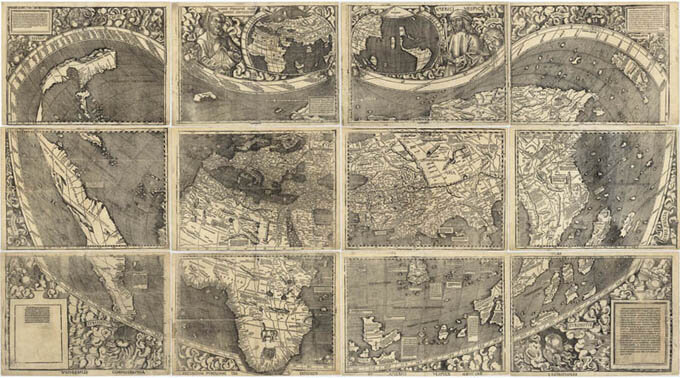Life Story Links: August 9, 2021
“I had already planned the journey back. During quiet afternoons I spread maps onto the floor and searched out possible routes to Ceylon. But it was only in the midst of this party, among my closest friends, that I realized I would be traveling back to the family I had grown from—those relations from my parents’ generation who stood in my memory like frozen opera. I wanted to touch them into words.”
—Michael Ondaatje, Running in the Family
A little “on this day in history” trivia: On August 3, 1492, Christopher Columbus set sail for the New World. It is commonly believed that his contemporaries feared he would sail off the edge of the Earth, but the fact is that 15-century Europeans did not believe the Earth to be flat. This reproduction of a 1507 world map by Martin Waldseemuller (image courtesy of Library of Congress) is the first to label America and show it as a separate land mass.
What’s New in Memoir & Biography
FORWARD GLANCE TO POSTERITY
American writer Shirley Jackson “fully expected her correspondence to be published one day. (She implored her parents to save everything she wrote to them.)” This newly collected collection of her letters covers a range of quotidian concerns as well as her experience making a living as a writer while raising four children.
BY QIAN JULIE WANG
“Searing and unforgettable, Beautiful Country is an essential American story about a family fracturing under the weight of invisibility, and a girl coming of age in the shadows, who never stops seeking the light.”
AN EXPANSIVE BIOGRAPHY
“Even at the end of this extraordinarily intimate book, Mildred remains somewhat of an enigma. ‘Despite her wish to remain invisible,’ Donner writes, ‘she left a trail for us to follow.’” Why All the Frequent Troubles of Our Days is “a remarkable work of family history.”
HAPPY-GO-LUCKY
“‘Who are you?’ I want to ask the gentle gnome in front of me. ‘And what have you done with Lou Sedaris?’” A new personal essay by David Sedaris charms and intrigues.
Storytelling Miscellany
OPENING QUESTIONS
Last week I wrote about my three favorite questions to start a personal history interview with, and when to use each to initiate free-flowing and interesting family stories.
VISUALIZING FORGOTTEN STORIES
“Are women real keepers of our past? … How important in the context of collective memory is personal history, and should it be part of the school textbook? Is it possible that the carefully listened story will teach us sensitivity and openness to other people?” Questions raised by the Art & Memory exhibit based on oral histories of Polish women’s wartime memories.
FROM SUITCASE TO THE CLOUD
A new advertising campaign for cloud storage provider Dropbox portrays the company as a trusted partner for storing—and sharing—our most cherished digital mementos. Here’s a clip:
Learning from Memoir Masters
ANNE LAMOTT, UNCENSORED
“Now, we all love stories about ourselves, right? That’s what the tribal storyteller tells. And that’s what people like about my stories, because they’re the stuff in me that I know is universal and holds up a mirror to them.” Anne Lamott in conversation with Tim Ferriss about “the really real,” the writing life, and so much more.
BETH KEPHART, REFLECTIVE
Through teaching memoir, Beth Kephart has explored “how it feels to go unseen, how the fear creeps in when our stories keep their distance, how it is essential, always, to live with purpose so that we might write with meaning.”
Leaving a Legacy
ETHICAL WILLS
“You might make the mistake of believing you are in control of your legacy, when it is largely determined by the people who have been influenced by you in some way.” Massachusetts–based personal historian Susan Turnbull offers two-hour ethical will workshops.
INHERITING STORIES—AND RESPONSIBILITY
As the generation that experienced the world’s first atomic attack fades away, Hiroshima is training younger volunteers to share the experiences of nuclear survivors. The memory keepers, called denshosha, spend three years learning to tell a survivor’s story as the survivor wants it told.
LIFE WRITING AS RESPONSIBILITY
“Without stories imparted from grandmother to mother, to son to daughter, our DNA is as sterile as computer code, a raw set commands with no context.” A co-founder of Biograph on preserving generational wealth through intergenerational storytelling.
...and a Few More Links
Book publishing cost calculator: What to expect to pay for everything from manuscript editing to promotion
“Don’t be afraid to tell your stories. The world will be better because you tell them.”
Google Photos releases a memories widget for Android.
Show-and-tell for grownups in Toronto
Tips for how to make photography help, not harm, your memories
A list of things millenial kids might actually want to inherit from their parents (hint: they all involve family memories!)
Short Takes

